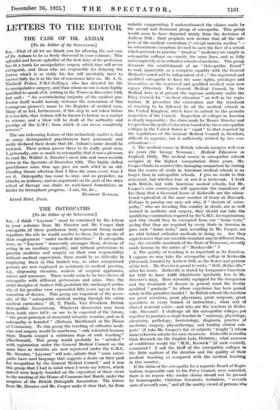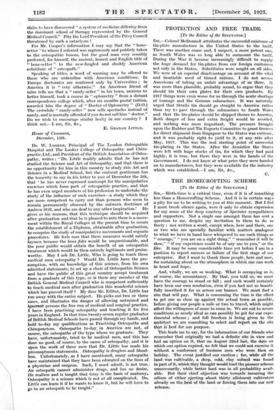THE OSTEOPATHS
[To the Editor of the SPECTATOR.]
Sin, I think " Layman " must be convinced by the letters in your columns from Mr. Streeter and Mr. Cooper that osteopaths (if these gentlemen truly represent them) would repudiate the role he would ascribe to them, for he speaks of their employment " under medical direction." If osteopaths were, as " Layman " innocently envisages them, desirous of acting in an auxiliary capacity, and without pretensions to practise medicine and surgery on their own responsibility without medical supervision, there would be no difficulty in employing them in this limited way, as other unregistered persons are now employed as assistants in medical practice, e.g., dispensing chemists, makers of surgical appliances, nurses and masseurs. There would seem to be two classes of osteopaths with different pretensions and aims. One, the strict disciples of Andrew Still, postulate the unchanged autho- rity of his peculiar view expounded fifty years ago as to the causation of disease. This group are impatient of the neces- sity of the " osteopathic student wading through the entire medical curriculum " (E. T. Phails, Vice President, British Osteopathic Association). Whatever discoveries may have been made since 1874—or arc to be expected of the future, " the great principal of structural integrity remains, and on it osteopathy is founded " (Kelman MacDonald at the House of Commons). To this group the teaching of orthodox medi- cine and surgery would be anathema, " only tolerated because State Boards compel a minimum dope of such teaching" (MacDonald). This group would probably be " satisfied " with registration under the General Medical Council on the same lines as dentists are now registered under the G.M.C. Mr. Streeter, "Layman" will note, admits that " some osteo- paths have used language that suggests a desire on their part for recognition by the General Medical Council," and it was this group that I had in mind when I wrote my letters, which indeed were largely founded on the exposition of these views to the meeting at the House of Commons last March, under the auspices of the British Osteopath Association. The letters from Mr. Streeter and Mr. Cooper make it clear that, far from unfairly exaggerating, I underestimated the claims made by the second and dominant group of osteopaths. This group would seem to have departed widely from the doctrines of Andrew Still ; their prophets now declare that all the sub- jects of the medical curriculum (" except materia medics "- an ostentatious exception devised to save the face of a school which pretends to practise " drugless " medicine) arc taught in osteopathic colleges on exactly the same lines, and as fully and completely as in orthodox schools of medicine. This group demands the establishment of an "Osteopathic Board" to rank apparently on a complete equality with the General Medical Council and be independent of it ; " the registered and qualified osteopaths to have the same rights, privileges and immunities as the registered and qualified medical man now enjoys (Streeter). The General Medical Council, by the Medical Acts, is at present the supreme authority under the Privy Council for " medical education " as well as for regis- tration. It prescribes the curriculum and the standards of teaching to be followed by all the medical schools in the United Kingdom, which have to submit to the periodic inspection of the Council. Inspection of colleges in America is clearly impossible ; the claim made by Messrs. Streeter and Cooper that the medical education founded by these osteopathic colleges in the United States is " equal " to that required by the regulations of the General Medical Council is, therefore, difficult to appraise, but is sufficiently refuted by two con- siderations :—
1. The medical course in British schools occupies well over six years (Sir George Newman : Medical Education in England, 1918). The medical course in osteopathic schools occupies at the highest computation three years. Mr. Cooper thinks to counter this damaging comparison by stating that the course of study in American medical schools is no longer than in osteopathic schools. I give no credit to this statement, but whether true or not it is irrelevant. I dealt with British, not with American medical schools, but Mr. Cooper's own countrymen will appreciate the impudence of his claim that a thousand hours at Kirksville are the educa- tional equivalent of the same number of hours at Harvard. Perhaps in passing one may ask why, if " doctors of osteo- pathy," who are invading this country in shoals, are so well trained in medicine and surgery, they should not take the qualifying examination required by the G.M.C. for registration; and why should they be exempted from our " home tests," seeing that they are required by every State in America to pass such " home tests," and, according to Mr. Cooper, are no whit behind orthodox medicals in doing so. Arc they apprehensive that our scientific standard may be different from, say, the scientific standards of the State of Tennessee, recently made famous by the antics of " Monkeyville " ?
2. The quality of teaching is as important as its duration. I suppose we may take the osteopathic college in Kirksville (Missouri), founded by Andrew Still, as the flower and pattern of the rest. Mr. Streeter is proud to write, " D.O., Kirksville," after his name. Kirksville is stated by Longman's Gazetteer for 1920 to have 4,000 inhabitants (probably less in Mr. Streeter's day). How miserably equipped for the recognition and the treatment of disease in general must the freshly qualified " graduate " be whose experience has been gained solely in this primitive hamlet I In British schools the teachers are great scientists, great physicians, great surgeons, great specialists in every branch of instruction ; what sort of clinical material exists—and who are the teachers in Kirks- ville, Missouri? I challenge all the osteopathic colleges put together to produce a single teacher in " anatomy, physiology, chemistry, pathology, bacteriology, diagnosis, practice of medicine, surgery, physiotherapy, and leading clinical sub. jects" (I take Mr. Cooper's list of subjects "taught ") whose name is known outside his own classroom. Kirksville is smaller than Keswick (in the English Lake District) ; what measure of confidence would the " M.D., Keswick" (if such existed), command ? I call the bluff of the osteopathic colleges in the little matters of the duration and the quality of their medical teaching as compared with the medical teaching in this country.
If the claim of the osteopaths for a separate Board of Regis- tration, responsible only to the Privy Council, were conceded, there is no reason why similar claims should not be pressed by homoeopaths, Christian Scientists, herbalists, " seventh sons of seventh sons," and all the motley crowd of persons who
claim to have discovered " a system of medicine differing-from the dominant school of therapy represented by the General Medical Council." Pity the Lord President of the Privy Council threatened by such a cataclysm !
For Mr. Cooper's information I may say that the " bone- setter "to whom I referred was rapturously and publicly taken to the osteopathic bosom, but the good man very sensibly preferred, for himself, the ancient, honest and English title of " bone-setter " to the new-fangled and shoddy American substitute of " osteopath."
Speaking of titles, a word of warning may be offered to those who are unfamiliar with American conditions. In Europe doctorates are conferred only by Universities ; in America it is " very otherwise." An American friend of mine tells me that a " candy-seller " in his town, anxious to better himself, took a course in " optometry " from a distant correspondence college which, after six months postal tuition, awarded him the degree of " Doctor of Optometry " (D.O.) The erstwhile " candy-seller " now sells spectacles instead of candy, and is mortally offended if you do not call him " doctor." Do we wish to encourage similar laxity in our country ? I think not.—I am, Sir, &c.,
House of Commons, December, 15th.
E. GRARAIII
Dr. W. LOOKER, Principal of The London Osteopathic Hcispital and The LoOker College of Osteopathy and Chiro- practic, Ltd., and PreSident of the British Association of Osteo- pathy, writes : " Dr. Little readily admits that he has not studied the Science and Art of Osteopathy, and that there is no opportunity for him in this country to study this Art and Science in a Medical School, but the eminent gentleman has the temerity to say in his letter to you of December the 5th, that ' he .has never expressed contempt for the manipulative exercises which form part of osteopathic practice, and that he has even urged members of his profession to undertake the study of the influence of such exercises—a study which they are more competent to carry out than persons who seem to remain permanently obsessed by the outworn doctrines of Andrew Still, and who are deaf to any other inspiration.' He gives as his reasons, that this technique should be acquired after graduation and that he is pleased to note there is a move- ment within the Royal Colleges at the present time to secure the establislunent of a Diploma, obtainable after graduation, to comprise the study of manipulative movements and cognate procedures. He feels sure that these measures would satisfy laymen because the bona fides would be unquestionable, and the poor public would obtain the benefit of an osteopathic treatment which would be then entirely legitimate and praise- worthy. May I ask Dr. Little, Who is going to teach these medical men osteopathy ? Would Dr. Little have the pre- sumption, with no knowledge of this science, from his own admitted stateinents, to set up a chair of Osteopathic Science and have the public of this great country accept treatment from a graduate of this type, or is there any member of the British General Medical Council who is competent sufficiently to teach medical men after graduation this wonderful science which has proved itself ? My dear Mr. Editor, Dr. Little has run away with the entire subject. He picks out two or three cases, and illustrates the danger of allowing untrained and ignorant persons the free run of medical and surgical practice. I have been practising osteopathy and teaching it for five years in England. In that time twenty-seven regular graduates of British Medical Schools have passed through my hands, and hold to-day my qualifications as Practising Osteopaths and Chiropractors. Osteopaths to-day, in America are not, of course, the osteopaths of the type whom we graduate. They have, unfortunately, tried to be medical men, and this has done no good, of course, to the cause of osteopathy, and it is upon the work of these men that Dr. Little has made his presumptuous statements. Osteopathy is drugless and blood- less. Unfortunately, as I have mentioned, many osteopaths have maintained that they have been educated on the lines of a*physician and surgeon. Such, I must admit, is not true.- An osteopath cannot administer drugs, and has no desire. He realizes and is taught that Gray is the basis of anatomy. Osteopathy is a science which is not at all complicated. Dr. Little can learn it if he wants to know it, but he will have to go to an osteopath to be taught."







































 Previous page
Previous page